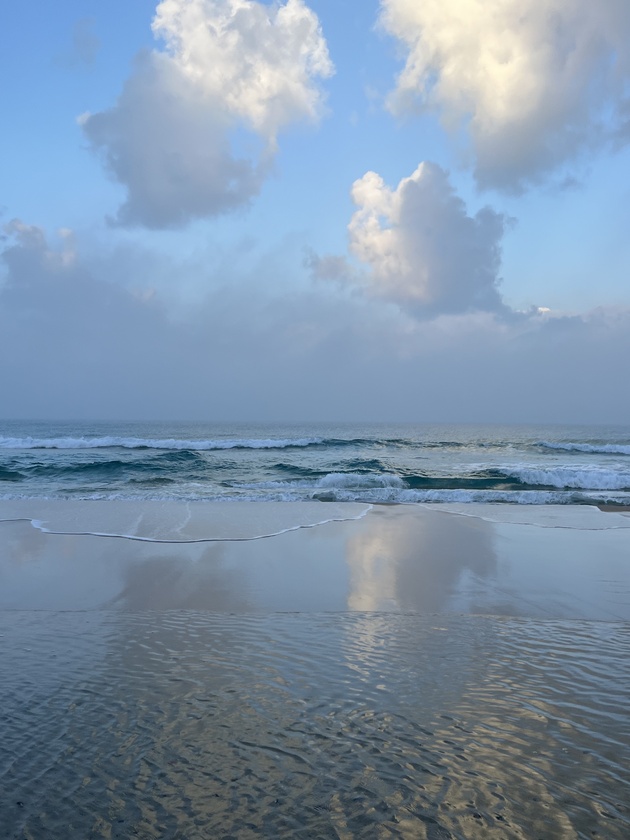Yesterday I focused on the question of whether the residents of the communities attacked on October 7th would be able to return and rebuild. For some, the answer is yes: they are taking on the challenge in the face of danger and trauma. For others, moving on is the only option.
I started out with a sunrise run along the Ashdod shore, then visited the local museum of Philistine history and culture, where they have incredible artifacts, including real columns from a Philistine temple at Gath -- such as the columns Samson pushed over in the Bible.
From there, I drove to Kibbutz Nirim, where I met Adele Raemer, who is rebuilding her home and her community. It was incredibly inspiring to see the effort that is going into restoring a place that was overrun on October 7 -- including female army volunteers, all new immigrants.
I then drove to the village of Gedera, where I met with a long-lost relative who is one of the leading combat engineers of the IDF, blowing up tunnels and terrorist buildings in Gaza. From there, I visited the Rai family in Kiryat Gat, survivors of Kibbutz Nir Oz who may not return.
I ended the evening with dinner in Ashdod -- kebab on the grill, with vegetables and Israeli salad. There is nothing like the food in Israel -- fresh, healthy, fulfilling. I lose a little weight when I'm here, just because I'm so active... but truly, people here know how to enjoy food.
I should add that while all of this was going on, as interesting and positive as it was, Israel was under severe rocket and missile attack in the north and center of the country, and news came that Rabbi Tzvi Kogan, a Chabad rabbi in Abu Dhabi, had been murdered by Iranian terrorists.
In July, I visited Abu Dhabi and was told by Jews there how safe they felt in the United Arab Emirates. The horrifying murder of Rabbi Kogan is a reminder that Jews are never really safe.
Adele Raemer told me that Israel still felt like the safest place for Jews. I asked her about that feeling: how could she feel that way after losing so many people she knew on October 7th that the names filled four notebook pages? She thought about that contradiction, and answered: in Israel, we Jews are in control of our security. The army is our army. That's the sense of safety.
This week’s portion launches the great story of Abraham, who is told to leave everything of his life behind — except his immediate family — and to leave for “the Land that I shall show you.”
There’s something interesting in the fact that Abraham is told to leave his father’s house, as if breaking away from his father’s life — but his father, in fact, began the journey, moving from Ur to Haran (in last week’s portion). His father set a positive example — why should Abraham leave him?
Some obvious answers suggest themselves — adulthood, needing to make one’s own choices, his father not going far enough, etc.
But I think there is another answer. Abraham (known for the moment as Abram) needs to establish his own household. This is not just about making one’s own choice, but really about choosing one’s own starting point. It’s starting over.
Sometimes we start over in fundamental ways even if much that surrounds us remains the same. Sometimes the journey we have to ...
The story of Noah is familiar; the details, less so.
Noah is often seen as an ambivalent figure. He was righteous -- but only for his generation. What was his deficiency?
One answer suggests itself: knowing that the world was about to be flooded, he built an Ark for the animals and for his own family -- but did not try to save anyone else or to convince them to repent and change their ways (the prophet Jonah, later, would share that reluctance).
Abraham, later, would set himself apart by arguing with God -- with the Lord Himself! -- against the destruction of Sodom and Gomorrah, saying that they should be saved if there were enough righteous people to be found (there were not).
Still, Noah was good enough -- and sometimes, that really is sufficient to save the world. We don't need heroes every time -- just ordinary decency.
Hi all -- as I noted last month, I'm going to be closing down my Locals page, at least for tips and subscriptions -- I may keep the page up and the posts as well, but I'm no longer going to be accepting any kind of payment.
Look for cancelation in the very near future. Thank you for your support!

















